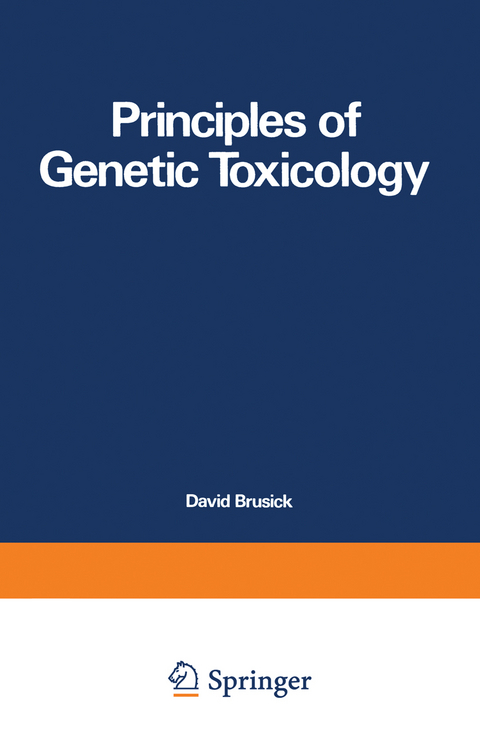
Principles of Genetic Toxicology
Springer-Verlag New York Inc.
978-1-4615-7663-1 (ISBN)
1 Origins of Genetic Toxicology.- The History of Genetic Toxicology.- Technology Transfer to Applied Genetics.- The Components of Genetic Toxicology.- References.- 2 Fundamentals of Genetic Toxicology.- Basic Genetics for Toxicologists.- DNA Alterations Resulting in Genotoxic Effects in Cells: Mechanisms and Categorization.- References.- 3 The Consequences of Genotoxic Effects in Humans and Other Mammals.- Gene Pool Consequences.- The Direct Effect of Mutagens on the Transmissible Gene Pool.- The Relationship of Genotoxic Effects to Other Toxicologic End Points.- Relationship of Potency between Mutagenicity Assays and in Vivo Oncogenicity.- References.- 4 Screening Chemicals for Genotoxic Properties.- and Background.- Characteristics of Adequate Screening Tests.- Strategies for Test Battery Development.- Interpretation of Data from Screening Tests.- References.- 5 Genetic Risk Estimation.- Definition of Risk.- Risk Estimation in Somatic and Germ Cells.- Molecular Dosimetry of Chemical Mutagens.- Measuring the Genotoxic Effect.- Approaches to Germ Cell Risk Using Animal Models.- Extrapolating Data from Short-Term Tests to Humans.- Extrapolation of in Vitro Data Directly to in Vivo Responses.- Threshold.- References.- 6 Applications of Genetic Toxicology to Environmental and Human Monitoring.- Monitoring Techniques.- References.- 7 The Genetic Toxicology Laboratory.- General Laboratory Areas.- Chemical Storage and Waste Disposal.- Laboratory Safety and Employee Monitoring.- Good Laboratory Practices Requirements.- References.- 8 Descriptions of Genetic Toxicology Assays.- General Classification of Genetic Toxicology Assays.- Description of Common Assays for Gene Mutation.- Tests for Chromosome Aberrations.- Microbial.- Tests for Primary DNA Damage.- References.- 9 SampleStudy Designs.- Selected Study Designs.- Protocol I: Ames Salmonella/Microsome Plate Assay.- References.- Protocol 2: Mitotic Recombination in S. cerevisiae Strain D3.- Protocol 3: Mitotic Gene Conversion in S. cerevisiae Strain D4.- Protocol 4: Mitotic Recombination in S. cerevisiae Strain D5.- Dosing Procedure.- Method.- Evaluation Criteria.- References.- Protocol 5: L5178Y TK+/?Mouse Lymphoma Forward Mutation Assay.- Protocol 6: Chromosome Aberrations in Chinese Hamster Ovary Cells.- Protocol 7: Sister Chromatid Exchange in Human Lymphocytes.- Protocol 8: Sister Chromatid Exchange in Chinese Hamster Ovary Cells.- Protocol 9: Determination of Unscheduled DNA Synthesis in Human WI-38 Cells.- Protocol 10: Unscheduled DNA Synthesis in Rat Liver Primary Cell Cultures.- Protocol 11: In Vitro Transformation of BALB/3T3 Cells.- Protocol 12: Microbial Host-Mediated Assay.- Protocol 13: Bone Marrow Cytogenetic Analysis in Rats.- Protocol 14: Dominant Lethal Assay in Rats.- Protocol 15: Heritable Translocation Assay in Mice.- Protocol 16: Mouse Micronucleus Assay.- Protocol 17: Mouse Sperm head Abnormalities.- Protocol 18: Somatic Mutation Assay in the Mouse (Spot Test).- Protocol 19: Test for Loss of X and Y Chromosomes in D. melanogaster.- Protocol 20: Heritable Translocation Test in D. melanogaster.- Protocol 21: Sex-Linked Recessive Lethal Test in D. melanogaster.- Appendices.- Appendix A: Preparation of S9 Liver Homogenates.- Induction of Microsomal Enzymes.- Preparation of the S9 Fraction.- Preparation of the S9 Mix.- References.- References.- Appendix C: Selected References and Reviews of Genetics and Genetic Toxicology.
| Erscheint lt. Verlag | 28.3.2012 |
|---|---|
| Zusatzinfo | XX, 280 p. |
| Verlagsort | New York, NY |
| Sprache | englisch |
| Maße | 152 x 229 mm |
| Themenwelt | Sachbuch/Ratgeber ► Natur / Technik ► Garten |
| Medizin / Pharmazie ► Medizinische Fachgebiete ► Pharmakologie / Pharmakotherapie | |
| Medizin / Pharmazie ► Pharmazie | |
| Studium ► 2. Studienabschnitt (Klinik) ► Humangenetik | |
| Veterinärmedizin | |
| ISBN-10 | 1-4615-7663-6 / 1461576636 |
| ISBN-13 | 978-1-4615-7663-1 / 9781461576631 |
| Zustand | Neuware |
| Haben Sie eine Frage zum Produkt? |
aus dem Bereich


